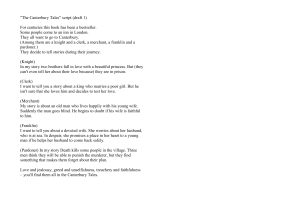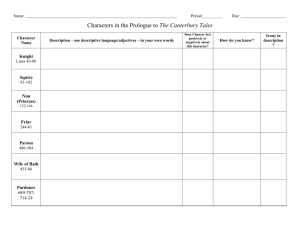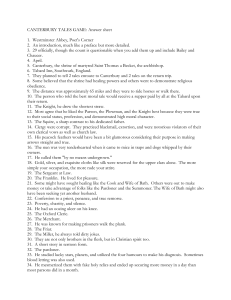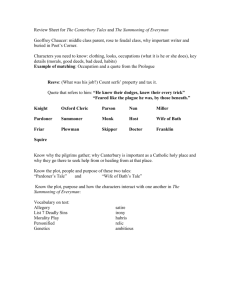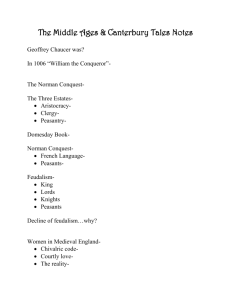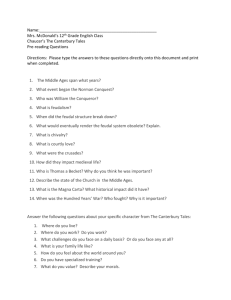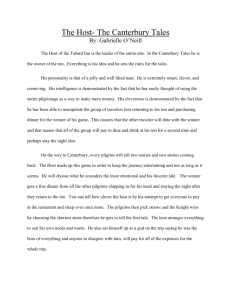Prologue text - MendenhallEnglish
advertisement
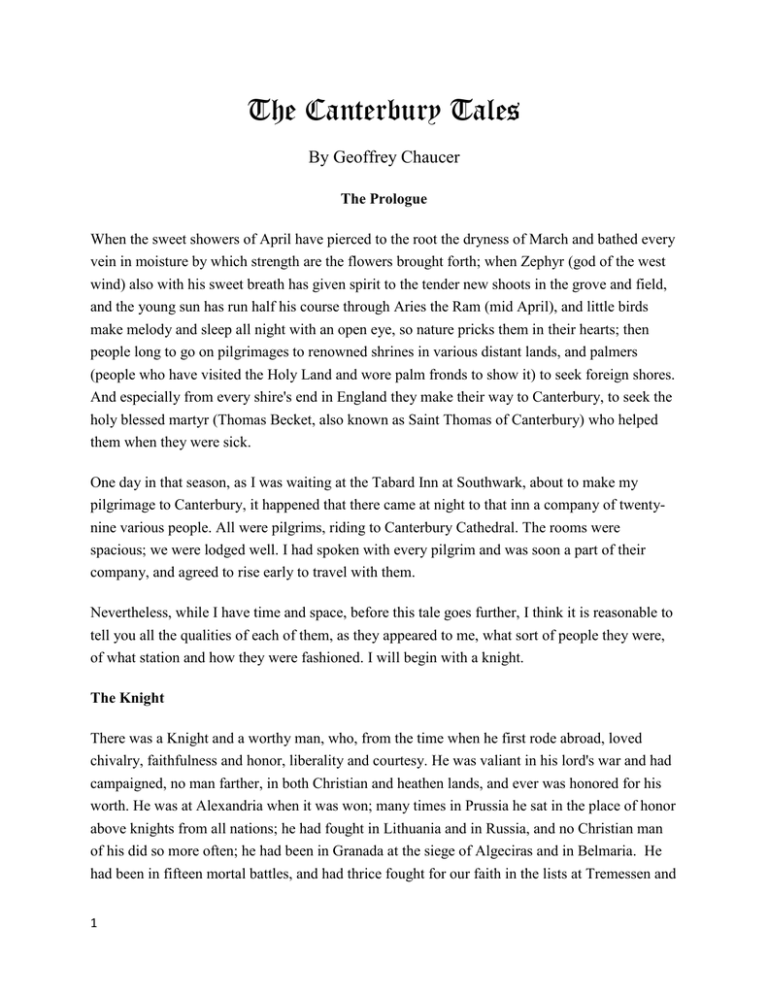
The Canterbury Tales By Geoffrey Chaucer The Prologue When the sweet showers of April have pierced to the root the dryness of March and bathed every vein in moisture by which strength are the flowers brought forth; when Zephyr (god of the west wind) also with his sweet breath has given spirit to the tender new shoots in the grove and field, and the young sun has run half his course through Aries the Ram (mid April), and little birds make melody and sleep all night with an open eye, so nature pricks them in their hearts; then people long to go on pilgrimages to renowned shrines in various distant lands, and palmers (people who have visited the Holy Land and wore palm fronds to show it) to seek foreign shores. And especially from every shire's end in England they make their way to Canterbury, to seek the holy blessed martyr (Thomas Becket, also known as Saint Thomas of Canterbury) who helped them when they were sick. One day in that season, as I was waiting at the Tabard Inn at Southwark, about to make my pilgrimage to Canterbury, it happened that there came at night to that inn a company of twentynine various people. All were pilgrims, riding to Canterbury Cathedral. The rooms were spacious; we were lodged well. I had spoken with every pilgrim and was soon a part of their company, and agreed to rise early to travel with them. Nevertheless, while I have time and space, before this tale goes further, I think it is reasonable to tell you all the qualities of each of them, as they appeared to me, what sort of people they were, of what station and how they were fashioned. I will begin with a knight. The Knight There was a Knight and a worthy man, who, from the time when he first rode abroad, loved chivalry, faithfulness and honor, liberality and courtesy. He was valiant in his lord's war and had campaigned, no man farther, in both Christian and heathen lands, and ever was honored for his worth. He was at Alexandria when it was won; many times in Prussia he sat in the place of honor above knights from all nations; he had fought in Lithuania and in Russia, and no Christian man of his did so more often; he had been in Granada at the siege of Algeciras and in Belmaria. He had been in fifteen mortal battles, and had thrice fought for our faith in the lists at Tremessen and 1 always slain his foe; he had been also, long before, with the lord of Palathia against another heathen host in Turkey; and ever he had great renown. And though he was valorous, he was prudent, and he was as meek as a maiden in his bearing. In all his life he never yet spoke any discourtesy to any living creature, but was truly a perfect gentle knight. To tell you of his equipment, his horses were good but he was not gaily clad. He wore a jerkin (short jacket, usually sleeveless) of coarse cloth all stained with rust by his coat of mail, for he had just returned from his travels and went to do his pilgrimage. Wife of Bath There was a Good Wife from near Bath, but she was somewhat deaf. She was so skilled in making cloth. In all the parish there was no wife who should march up to make an offering before her, and if any did, so angered she was that truly she was out of all charity. Her kerchiefs were very fine in texture; and I dare swear those that were on her head for Sunday weighed ten pounds. Her hose were of a fine scarlet and tightly fastened, and her shoes were soft and new. Her face was bold and fair and red. All her life she was a worthy woman; she had had five husbands, besides other company in her youth, but of that there is no need to speak now. She had thrice been to Jerusalem; many distant streams had she crossed; she had been on many pilgrimages. This wandering by the way had taught her various things. To tell the truth, she was gap-toothed; she sat easily on an ambling horse, wearing a fair wimple (a garment that goes around the neck, chin and head) and on her head a hat as broad as a buckler (small shield) or target. About her broad hips was a short riding skirt and on her feet a pair of sharp spurs. Well could she laugh and prattle (talk in a childish way) in company. Love and its remedies she knew all about, I dare give my word, for she had been through the old dance. The Miller The Miller was a stout fellow, big of bones and brawn; 224 pounds and everywhere he went to a wrestling match he would always carry off the prize ram. He was short-shouldered and broad, a thick, knotty fellow. There was no door that he could not heave off its hinges, or break with his head at a running. His beard was as red as any sow or fox, and broad like a spade as well. Upon the very tip of his nose he had a wart, and on it stood a tuft of red hair like the bristles on a sow's ears, and his nostrils were black and wide. At his thigh hung a sword and buckler. His mouth was as great as a great furnace. He was a teller of dirty stories and a buffoon, and it was mostly of sin and obscenity. He knew well how to steal corn and take his toll of meal three times over; and yet 2 he had a golden thumb, by God! He wore a white coat and a blue hood. He could blow and play the bagpipe well, and with its noise he led us out of town. The Pardoner With him rode a gentle Pardoner. This Pardoner had waxy-yellow hair, hanging smooth, like a hank of flax, spread over his shoulders in thin strands. For sport he wore no hood, which was trussed up in his wallet; riding with his hair disheveled, bareheaded except for his cap, he thought he was all in the latest fashion. His eyes were glaring like a hare's. He had a veronica sewed on his cap, and his wallet, brimful of pardons hot from Rome, lay before him on his saddle. His voice was as small as a goat's. He had no beard nor ever would have, his face was as smooth as if lately shaven; I believe he was a mare or a gelding. But as for his trade, from Berwick to Dover there was not such another pardoner. In his bag he had a pillow-case which he said was our Lady's kerchief, and a small piece of the sail which he said St. Peter had when he walked upon the sea and Jesus Christ caught him. He had a cross set full of false gems, and pigs' bones in a glass. But with these relics, when he found a poor parson dwelling in the country, in one day he gained himself more money than the parson gained in two months. And thus, with flattering deceit and tricks, he made the parson and the people his dupes. But to give him his due, after all he was a noble ecclesiastic in church; he could read well a lesson or legend and best of all sing an offertory. For he knew well that when that was done he must preach and file his tongue smooth, to win silver as he well knew how. Therefore he sang merrily and loud. The Host (Harry Bailey, Innkeeper) Narrator: Now I have told you in few words the number of this company and why they were assembled in Southwark at this noble inn, the Tabard. But now it is time to say how we behaved that same evening, when we had arrived at that inn; and afterward I will tell you of our journey and the rest of our pilgrimage. Our host (Harry Bailey) put us all in good spirits, and soon brought us to supper and served us with the best of provisions. The wine was strong and very glad we were to drink. Our Host was a seemly man, fit to be marshal in a banquet-hall, a large man with bright eyes, bold in speech, wise and discreet, lacking nothing of manhood: there is not a fairer burgess in Cheapside. He was in all things a very merry fellow, and after supper, when we had paid our bills, he began to jest. "Now gentle people," he said, "truly you are heartily welcome to me, for, by my word, if I shall tell the truth, I have not seen this year so merry a company at this inn at once. You go to 3 Canterbury, God speed you, and may the blessed martyr duly reward you! I know full well, along the way you mean to tell tales and amuse yourselves, for in truth it is no comfort or mirth to ride along dumb as a stone. "And therefore, as I said, I will make you a game. If it please you all by common consent to stand by my words and to do as I shall tell you, now, by my father's soul (and he is in heaven), tomorrow as you ride along, if you are not merry, I will give you my head. Hold up your hands, without more words!" Our mind was not long to decide. We thought it not worth debating, and agreed with him without more thought, and told him to say his verdict as he wished. "Gentle people," said he, "please listen now, but take it not, I pray you, disdainfully. To speak briefly and plainly, this is the point, that each of you for pastime shall tell two tales in this journey to Canterbury, and two others on the way home of things that have happened in the past. And whichever of you bears himself best, that is to say, that tells now tales most instructive and delighting, shall have a supper at the expense of us all, sitting here in this place, beside this post, when we come back from Canterbury. And to add to your sport I will gladly go with you at my own cost, and be your guide. And whoever opposes my judgment shall pay all that we spend on the way. If you agree that this will be so, tell me now, without more words, and without delay I will plan for that." We agreed to this thing and pledged our word with glad hearts, and prayed him to do so, and to be our ruler and to remember and judge our tales, and to appoint a supper at a certain price. We would be ruled at his will in great and small, and thus with one voice we agreed to his judgment. At this the wine was fetched, and we drank and then each went to rest without a longer stay. 4
